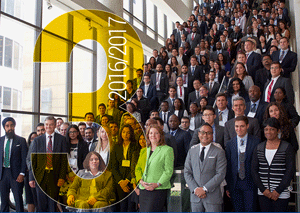
Ontario’s Law Practice Programs are kicking off for another year this week, marking the third year of the Law Society’s Pathways pilot project.

Ryerson University’s LPP program kicked off yesterday with 270 candidates enrolled in the program. Meanwhile, at the University of Ottawa’s French LPP program, there are 26 candidates enrolled.
The LPP provides aspiring lawyers another path to the Ontario Bar. The LPP consists of a four-month training course and a four-month work placement.
This spring, 219 candidates finished the Ryerson program, while 11 completed the French program in Ottawa.
Initially, there were 330 candidates interested in the 2016/2017 Ryerson LPP program.
“This year, we have definitely seen an increase in the number of candidates interested in the program. We do see a bit of attrition as the program begins and candidates determine whether it’s the right path for them, so it’s possible we could lose a few candidates between now and December as we did in the first two years,” says André Bacchus, assistant director, work placement office with the LPP at Ryerson.
Anne Levesque, co-director of the LPP program at the Faculty of Law at University of Ottawa, says many of the candidates for this fall are recent graduates coming to the program right out of law school.
Ottawa U’s online orientation starts next week and in person Sept. 2. Students to the French program are coming from the University of Ottawa, University of Montreal and Université de Moncton.
“They have a really diverse set of skills,” says Levesque. “Some have PhDs and many have done graduate studies.”
Levesque is joined at the French LPP program this year by co-director Lise Rivet, who has been with the program since its launch in 2014.
Rivet says a new component of the French program this year will be to have candidates take part in a one-day legal information clinic in Sudbury to expose them to practice in francophone and northern communities. Areas of law to be covered will include family law, wills and estates and landlord tenant issues.
“It will give them an opportunity to work with clients and give legal information,” she says. “They’ll also be networking with other lawyers in northern Ontario at that time.”
Not all of the 26 French LPP candidates will go on the trip north, but all will be helping with the program and doing equivalent activities.
Rivet says many lawyers in smaller northern communities such as North Bay are nearing retirement, while francophone areas such as Sudbury, Sault Ste. Marie, Elliott Lake and Sturgeon Falls are in need of French-speaking lawyers.
“We’re delighted that a lot of people are starting to choose the Law Practice Program as their go-to training during their access to the profession process,” says Rivet. “It’s exciting that people are interested in taking this type of practical training and getting exposed to many areas of law.”
Bacchus says Ryerson is seeing recent grads as well as those with previous careers and other experience as well.
“We’re also attracting people who are mature students or transitioning from other areas of practice and looking to get into Ontario,” he says.
Within six months of their call to the bar, Bacchus says, 75 per cent of Ryerson’s candidates are working in law.
Some of the French candidates have found jobs with a small criminal law firm in Ottawa, another had a contract renewed with a national union and another in a legal clinic.
“We were really happy about the criminal law job because when we did our initial consultation there was a shortage of criminal law lawyers available with French,” says Levesque.
At the end of this year’s programs, the Law Society of Upper Canada will review the LPP programs for possible renewal.